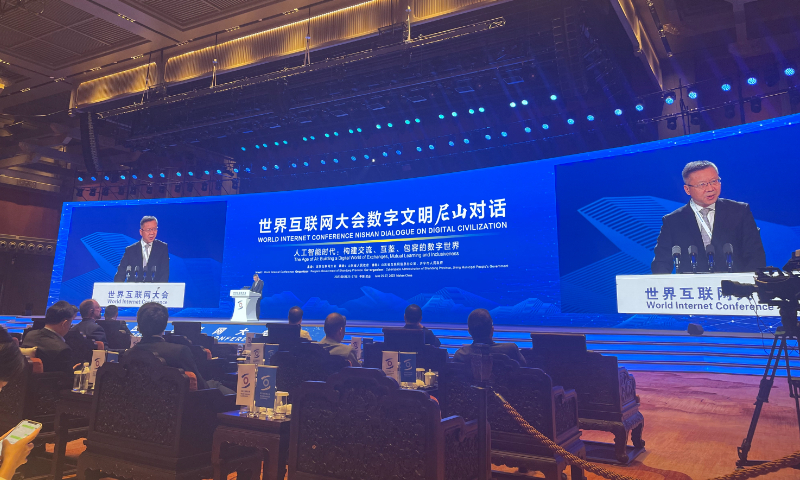China's people-centered AI governance conducive to the vast majority of people: Chinese scholar

Zhang Weiwei, director of the China Institute at Fudan University, addresses the World Internet Conference Nishan Dialogue held in Nishan, East China's Shandong Province on Monday. Photo: Liu Caiyu/GT
China's internet governance and artificial intelligence (AI) focuses on meeting people's pursuit of a better life and providing affordable information services. This is in stark contrast to some countries who have politicized internet development, a Chinese scholar said at a forum on Monday.
Addressing the World Internet Conference Nishan Dialogue held in Nishan, East China's Shandong Province, Zhang Weiwei, director of the China Institute at Fudan University, said AI development is a double-edged sword, offering opportunities but also challenges. It could disrupt many industries and even be weaponized, ultimately harming humanity as a whole.
Zhang shared how he viewed the Chinese way of governing the internet and AI, which presents a striking contrast with some major countries.
He said that the Chinese civilization has lasted for more than 5,000 years but it is still vibrant thanks to embracing new things and a people-oriented form of governance.
Zhang pointed out that the global governance of AI needs consultative democracy, which the Chinese nation is best at. Joint consultation and democratic consultation are needed from the international community in order to truly find solutions to technical issues, ethical issues and legal issues facing AI technology.
"We must be very vigilant and resolutely oppose the egoistic and beggar-thy-neighbor approach taken by some countries. They even propose to draft an AI code of conduct that excludes China… their approach is shortsighted and cannot succeed," Zhang said.
While China develops people-centered AI, some countries have politized the technology, Zhang noted, which eventually leads to the spread of populism and serious social divisions in these countries.
China's people-centered governance has formed a balance among political forces, social forces and capital forces, which is conducive to the vast majority of the people, Zhang said.
Shen Jian, deputy director-general of the Department of Arms Control of the Ministry of Foreign Affairs, also addressed the conference. The Chinese government attaches great importance to AI governance, Shen said especially regarding potential risks so as to safeguard the interests of the people and national security.
Because of diversified participance in the AI field, one country cannot achieve AI governance all alone. Shen said that some countries pursue an egoistic policy of national priority and regard AI as a tool in competition, which intensifies separation of international security governance and raises the threshold for the development and governance of AI technology in developing countries.
Countries should oppose using AI to seek hegemony. All countries, especially major countries, need to adopt a prudent and responsible attitude and strengthen self-restraint, in order to ensure that AI is truly safe and reliable, Shen said.
When taking about AI governance, countries should build common and shared AI governance, rather than creating discriminatory barriers on the basis of ideology to undermine the rights of all countries, especially developing countries, to have access to emerging technologies, the Chinese official said.
Shen suggested countries take into account differences in national conditions to establish an AI governance system to suit their own countries.
As an official in arms control, Shen further noted that countries should not use AI to sabotage the national territory of other countries or develop military AI applications.
All countries, big or small, strong or weak, rich or poor, have equal rights to participate in AI global governance, Shen said, calling for a sense of openness and cooperation and an increase in representation for developing countries in AI global governance.




